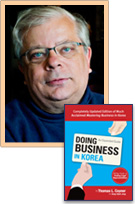 Tom Coyner is the president of Soft Landing Consulting. He has twenty-five years of experience in Japan and Korean working for American firms, as well as seven years working for Japanese companies in the US, and he is co-chair of the American Chamber of Commerce in Korea’s SME Committee and Senior Commerical Advisor for Joowon Attorneys at Law in Seoul. Author of Doing Business in Korea, Tom is recognized as a leader in assisting foreign companies wishing to do business in Korea and his book is available online from Seoul Selection.
Tom Coyner is the president of Soft Landing Consulting. He has twenty-five years of experience in Japan and Korean working for American firms, as well as seven years working for Japanese companies in the US, and he is co-chair of the American Chamber of Commerce in Korea’s SME Committee and Senior Commerical Advisor for Joowon Attorneys at Law in Seoul. Author of Doing Business in Korea, Tom is recognized as a leader in assisting foreign companies wishing to do business in Korea and his book is available online from Seoul Selection.
To listen to the interview, download the .mp3, subscribe on iTunes, read the transcript and/or discuss this interview and this topic with other members of Korea Business Central, visit the following discussion link:
https://stevenbammel.com/category/archives/kbcforum/topics/korea-business-central-9 [EXPIRED LINK REMOVED: https://stevenbammel.com/category/archives/kbcforum/topics/korea-business-central-9]
The full list of interviews in the Korea Business Interview Series is maintained here: https://stevenbammel.com/post/kbc_korea_business_interviews
Main Points of the Interview
Topic #1 – Understanding the Korean Consumer
- Korean consumers can be surprisingly demanding. One reason this came about is that Korean providers used to make up for inferior service by offering exceptional follow-up service. Today, Korean quality has improved, but immediate after-sales support is still provided. Foreign companies often fail in the area of customer service.
- To succeed in the Korean market, foreign companies need to be competitively different than local companies, and do so in a way that local companies cannot easily emulate, such as by reputation or advanced functionality or engineering.
- Koreans in their late 20s and early 30s often havve the highest disposable income in Korea, particularly since many are getting married relatively late and still living with parents until marriage. These people are very Internet-connected and fads and fashions change very rapidly, with word-of-mouth over the Internet driving consumer trends.
- The iPhone is a good example of a foreign product that has succeeded in Korea by being different and better. The mainstream media, headily dependent on advertising from Korean producers, predicted that the iPhone wouldn’t meet the needs of consumers in Korea. But the young, affluent demographic didn’t get its news from the mass media, but through the Internet and was ready for the iPhone
- Korean women – often, housewives – control the family budget and their influence on family buying decisions cannot be ignored.
- Koreans today are relatively free spenders and make buying decisions based on getting ahead – or at least, not falling behind – socially. Koreans will spend based on social pressures, at least as much as based on functionality.
- A key advertising theme for the Korean market is: “This is the good life, this is what modern Korea is all about. You should participate in it like everyone else, so don’t be left behind because everyone else is moving forward.”
Topic #2 – Experiences of Foreign Companies in the Korean Market
- A key question that determines whether a foreign companies is successful in Korea: “Does home office give the expatriates working in Korea the authority and means to adapt their products and services to the Korean market?”
- One company that failed to answer the above question adequately was Carrefour; one that has been very successful is Tesco and their Homeplus brands, which they’ve done, in part, by posting very few expatriates in their Korea operation and relying on top local talent. This has allowed them to adapt thoroughly to the Korean market.
- The Korean market has, over the last 10-15 years, become very consumer driven, what Coyner refers to as “The tail wags the dog”. The days of limited consumer choice are long gone.
Topic #3 – Marketing Strategy and Market Entry in Korea
- Korea is less risky than a number of other truly Asian markets. “Truly Asian” means those markets without a legacy of being British or American colonies.
- Korea is a country ruled by law and the court system is reasonably consistent and fair. The probems lie with the laws themselves, which are often contradictory, but it’s not like China where contracts may be unenforceable.
- It is relatively easy to invest in Korea, and to repatriate profits.
- There are a lot of English-speaking business professionals and most market opportunities and resources are centralized around Seoul.
- Korea is a good place to learn how to do business in Asia, before going into China or Japan. If you cannot succeed in Korea, you’re probably not going to succeed in China or Japan, either.
- One challenge of business in Korea is the mindset, “Well, we don’t do this in Korea” as a catch-all for opposing a foreign approach. This retort needs to be taken with a grain of salt and not as a blanket reason not to do something different, which may in fact be an opportunity. You’ve got to do your homework in the Korean market and it takes maturity to know when to take risks in the Korean market.
Topic #4 – Advertising and PR in the Korean Market
- The selection of advertising media depends a great deal in Korea, as elsewhere, on the product and demographic. Don’t overlook the power of Internet advertising though for many products and demographics since even Koreans in their 40s, 50s and 60s really do make purchasing decisions based on what they see on their PC screens or cell phones.
- When selecting a local Korean advertising company, make sure your account manager isn’t just the best English-speaker person on-staff; insist on someone who’s more mature and has credentials with publishers and editors.
Closing Thoughts
- Two reactions when people first come into the Korean market for the first time: 1) “I had no idea that Korea is so developed” and 2) “Compared to other markets, consumers are much more acctive and consuming a lot more.”



